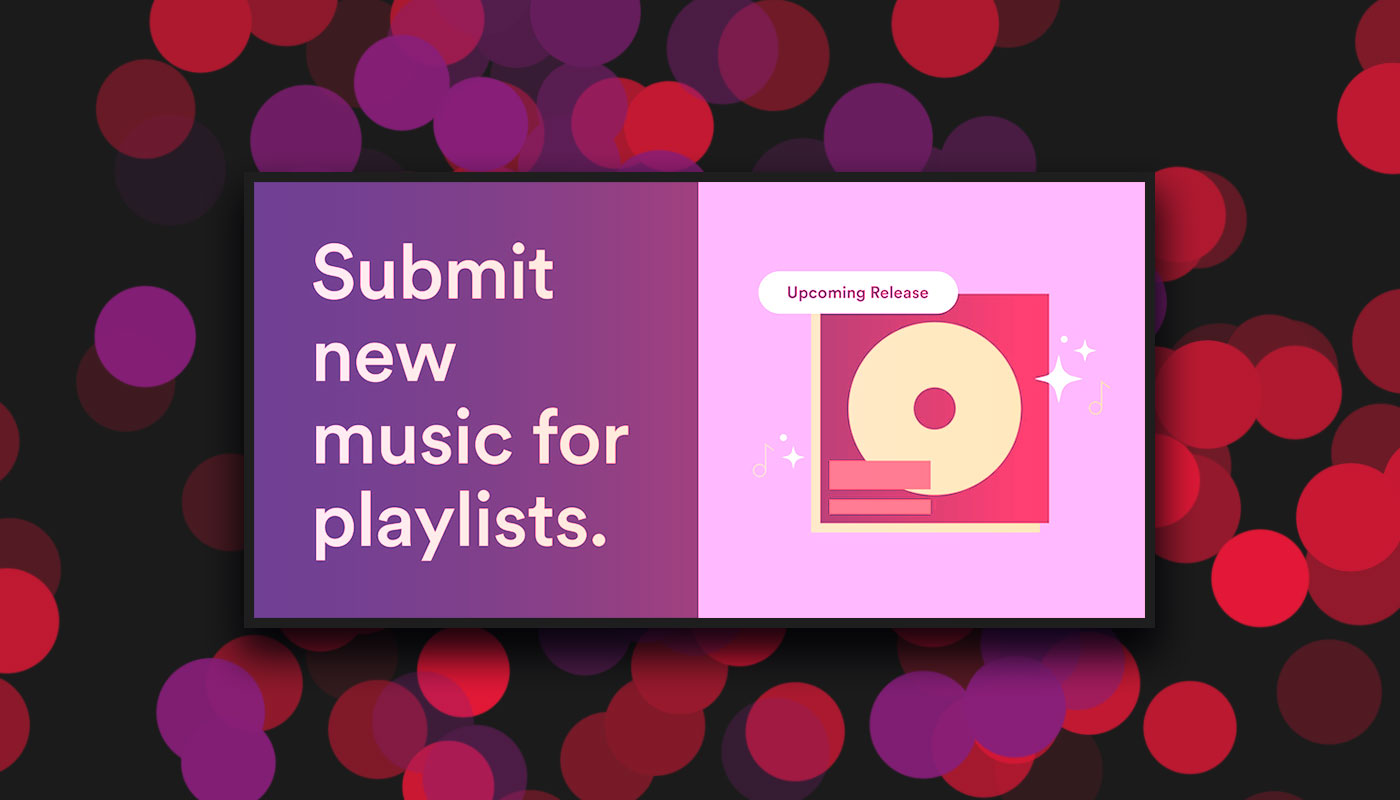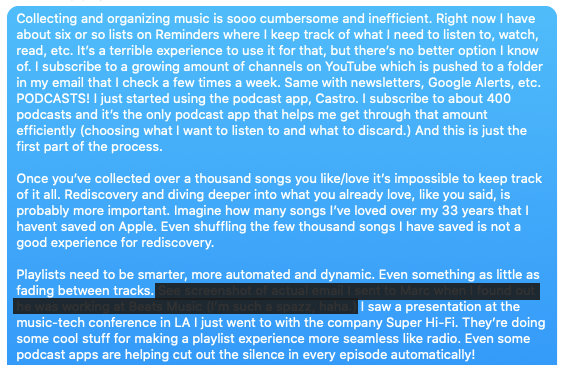



I find at least one insightful thing a day in a podcast. I wanted to put together a dozen or so music podcasts that have been particularly memorable, but I noticed my top picks had two themes in common: they’re all interviews with current and former employees of Spotify and have to do with music discovery.
Spotify’s VP, Paul Vogel, recently stated that music discovery is one of Spotify’s main focuses. As Vogel describes, “When you own discovery, you own so much of the ecosystem; you own demand generation. Over time, you end up owning gross margin when you own discovery and demand generation.” In other words, the first music service to make music discovery a viable business will be the leader in music streaming.
The four podcast episodes below helped me verbalize my thoughts on how music editorial and curation will help Spotify get there. This article only scratches the surface of the future of music, so I plan to start a series that will highlight other podcast episodes with great conversations around music. Let’s call it “Great Talks in Music Podcasts.”
“When you own discovery, you own so much of the ecosystem; you own demand generation. Over time, you end up owning gross margin.” – Paul Vogel, Spotify VP
The Future of A&R with Tuma Basa and Tunji,
Interview by The Whooligan at DJ Jazzy Jeff’s Playlist Retreat
Even though it’s technically not a podcast, there is no talk I recommend more than the one with Tuma Basa and Tunji Balogun, moderated by The Whooligan. Previously, Tuma was Head of Hip-Hop Programming at Spotify and is now Director of Urban Music at YouTube Music. Tunji is now VP of A&R at RCA Records. The panel goes into all areas of A&R, but its main focus is how music discovery has evolved from the analog days.
Around 32 minutes in, Tuma talks about how artist development should also expand into life development, for example helping musicians better understand their finances. Similar to how the NBA brings in rookies and helps them develop on and off the court, so should the music industry for musicians.
Tuma goes on to say how he’s “a big proponent in music curation being recognized as an art form.” If anything, it should at least be recognized as a foundational part of music discovery. And like musicians, music curators need help with their own development. A first step would be to help curators with the drudge work of collecting and organizing hundreds of songs daily.
“I’m a big proponent in music curation being recognized as an art form.” – Tuma Basa, former Head of Hip Hop Programming at Spotify
How Spotify Saved the Music Industry (But Not Necessarily Musicians) with Daniel Ek, Interviewed by Stephen Dubner on Freakonomics Radio
Stephen Dubner sits down with CEO and co-founder of Spotify, Daniel Ek, to talk about how Spotify shifted the music industry to streaming and how Ek plans to better serve independent musicians in the future.
Spotify’s new mission is “to inspire human creativity by enabling a million artists to be able to live off their art and a billion people to be able to enjoy and be inspired by it.” Essentially, to create an even playing ground by allowing musicians to more easily find an audience and get paid. Eventually creating a healthier, growing music industry.
No one knows exactly how many musicians right now live off their music from Spotify alone, but it’s likely not more than 5% of Ek’s ambitious million. In order for Ek and his team to even the playing ground for the art of music creation, they’ll have to do it for the art of curation first.
“Our mission is to inspire human creativity by enabling a million artists to be able to live off their art and a billion people to be able to enjoy and be inspired by it.” – Daniel Ek, CEO & co-founder of Spotify
Troy Carter, Interviewed on The Bob Lefsetz Podcast
In Bob Lefsetz’s interview with Troy Carter, the first hour is all about what Carter is best known for, most notably helping create Lady Gaga’s career. After that, they move into Carter’s work at Spotify running Creator Services (he has since moved on.)
Carter’s big reveal about music discovery at Spotify was around “third-party playlisters,” i.e. curators not directly working for Spotify. Carter explained that Spotify had to shift its music discovery efforts into an internal editorial team because many third-party playlisters were trying to game the system by accepting money for playlist placement, similar to radio’s payola problem.
An internal editorial team is part of a solid foundation for music discovery on Spotify. It can serve as a standard for best practices for playlisters. However, it still needs to extend its branches by developing other forms of music curation, including independent playlisters & editors, djs, radio hosts, podcasters, bloggers, music supervisors, dancers, social media influencers, friends & family, and the masses. The bulk of music discovery happens here and always will. No internal editorial team can compete with what the masses can curate. It’s just infinitely harder to organize on such a large scale. Something only a machine can do.
Carter explained that Spotify had to shift its music discovery efforts into an internal editorial team because many third-party playlisters were trying to game the system.
Gustav Soderstrom, Chief R&D Officer Spotify,
Interviewed on the Artificial Intelligence Podcast
Lex Fridman interviews all the experts in artificial intelligence. I think it’s his MIT hook up (he’s a researcher there.) In Fridman’s interview with Chief Research & Development Officer at Spotify, Gustav Soderstrom picks up where Daniel Ek’s interview on Freakonomics Radio left off.
Soderstrom starts off by explaining why Spotify has been so successful for over 10 years by first competing with piracy. It made music easily accessible at a reduced load time that felt like you’ve got the whole world’s music in your hands. Unlike downloading a file, you didn’t have to wait for more than a few seconds or less to play a song. As Fridman put it, Spotify taught us to enjoy music, not just hoard it on a hard drive.
There’s still a problem with sifting through over 50 million songs on Spotify and organizing the hoards in Spotify playlists, even for a full-time editor. Nearly 40,000 new songs a day are uploaded to Spotify. It’s going to take a machine learning around the clock for each and every one of us to get through and make sense of it all.
Spotify seems to be starting off on one strong foot with what Soderstrom calls “algotorial:” an internal term used to describe editors that curate in their domain expertise (genre, culture) to create playlists powered by machine learning algorithms. Soderstrom explains one example where editors essentially become product managers around a topic, theme, mood, whatever. “Songs to Sing in a Car” is his example. The editors then collect a few thousand songs that are good as hell to sing in a car and based on a listener’s “taste vectors” could personalize 20 or so tracks just for them.
One thing I didn’t hear in Soderstrom’s talk about Spotify’s algotorial approach, is how machine learning has empowered editors to make their jobs easier and more impactful. The focus of analysis being on the curator rather than just the listener. Imagine having the memory of a machine, along with the computational power. I’d update my playlists much more often and this would be a much fresher place.
Algotorial: an internal term at Spotify used to describe editors that curate in their domain expertise (genre, culture) to create playlists powered by machine learning algorithms.
Music discovery is up for grabs until music curation is taken as seriously as music creation is in the music business.
After thought: it’s hard writing into the big black hole called the internet. Just like with podcasting into an empty mic, sometimes it’s better to get your thoughts out with another person. Here’s a message I sent to a friend about my complications with curation.
